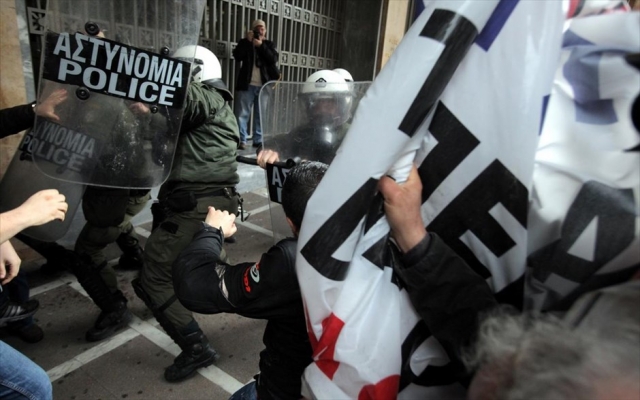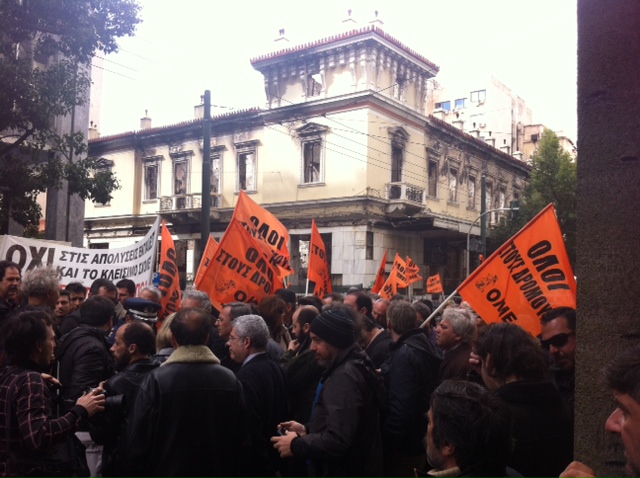Anastasia Balezdrova
The issue of settling the German war reparations was one of the main topics of the talks between Greek President Karolos Papoulias and his German counterpart Joachim Gauck who is on a three-day official visit to Greece. In their joint statements to the media, Karolos Papoulias said that Greece has not given up on this request and bilateral negotiations on this issue have to start as soon as possible.
Joachim Gauck replied in turn that his position could not differ from the legal opinion of the German government. "What I can do during our visit to Ioannina is to find the words and admit the guilt of Germany for claiming victims in the region."

The German President continued, adding, "The guilt is not just material, it has moral aspects as well. The approach of Germany was wrong and many things are forgotten. But moral guilt exists. I will show the way. The horrors of Nazism must remain in our memory."
On Friday, the two presidents will visit Lingiades village near Ioannina to honour the memory of the victims of Nazism. Joachim Gauck moved his Greek counterpart, calling him "a fighter against these barbarians." The German president also stated, "I am happy that I can represent a very different Germany from the one you saw then."
His visit to Athens had provoked few, but quite violent, protests. The police ban on conducting rallies and processions during the stay of the German delegation angered the union of the Communist Party of Greece, PAME, and the municipal workers and primary school teachers who remembered last week’s clashes with the law enforcement authorities.
The police had implemented, since the morning, their plan for the introduction of draconian measures in the area around Syntagma Square and Irodou tou Attikou Street, where the residences of Greece’s President and Prime Minister are located, and banned all public rallies and processions in the open from 08:00 am to 07:00 pm. For security reasons, they closed the underground station at the same square at 1:30 pm.
Despite the torrential rain that poured down over the centre of Athens shortly before noon, about 300 members of the PAME union marched from Omonia Square to the government buildings. In the middle of Stadiou Street their march was hampered by the police buses deployed there by the security forces in implementation of the ban on holding rallies. A group of about 50 members of PAME was able to squeeze through and tried to set off to the Ministry of Finance. Then the riot police forces stopped them with tear gas. The protesters responded by hitting them with the poles of the union flags they were carrying, and, for a few minutes, Stadiou Street turned into an arena. There were several minor injuries due to the clashes.

Photo: Eurokinissi:
About an hour later municipal workers, former cleaners in the Ministry of Finance and teachers gathered at Klafthmonos Square, and members of PAME joined them too. Calls for general discontent against the ban on protests could be heard from the loudspeakers during the rally as well as criticism towards the two big unions ADEDY and GSEE for having failed to organize a procession "on the day when the representative of the country that is trampling on the Greek people is in Athens."

They started marching down Stadiou Street again but after a few metres, they had to stop at the police buses. Having failed to convince the policeman in charge of the blockade that he was obliged to allow them to protest against the mobility programme and the upcoming cuts of civil servants, they surprisingly set off to the streets which lead to the parliament building. They faced police blockades everywhere and after about an hour and a half they returned to Klafthmonos Square and dispersed. Meanwhile, they had disturbed the traffic on major streets that were not closed by the police.

At the same time, the Greek government is continuing the negotiations with the representatives of the lenders. One of the most important issues in the debate, on which no agreement has been reached, at least so far, is the recapitalization of Greek banks. Within this framework, the Bank of Greece presented the report of the international agency BlackRock on the status of the Greek banking sector, according to which the capital requirements of the banks by the end of 2016 amount to 6.4 billion euro.